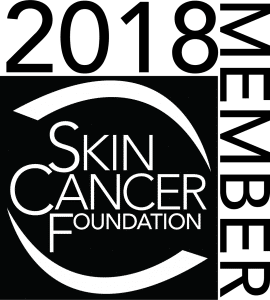 We attended the B’more Healthy Expo at the Baltimore Convention Center on March 19th. It was a great time and we were able to provide over 147 sun-exposed skin screenings. During the day, we discovered:
We attended the B’more Healthy Expo at the Baltimore Convention Center on March 19th. It was a great time and we were able to provide over 147 sun-exposed skin screenings. During the day, we discovered:
- 7 clinically atypical moles – These irregular, ill-defined, variegated colored moles may indicate an increased risk of melanoma. Patients should reduce sun exposure and conduct regular self-examinations for new moles or changes in existing ones. In addition, these lesions should continue to be monitored by a dermatologist and biopsied if any changes occur.
- 5 cases of Actinic Keratosis – These rough, scaly patches on the skin are caused by years of sun exposure. They are most commonly found on the face, lips, ears, back of hands, scalp and neck. Actinic Keratosis are considered pre-cancerous growths and should be treated.
- 3 suspicious Basal Cell Carcinomas – Basal Cell Carcinoma is the most common form of skin cancer. It often look likes open sores, red patches, pink growths, shiny bumps or scars. These lesions are usually caused by a combination of cumulative and intense, occasional sun exposure.
- 2 suspicious Squamous Cell Carcinomas – This is the second most common form of skin cancer. It tends to look like scaly red patches, open sores, elevated growths with a central depression or warts that may crust or bleed. Cumulative sun exposure and UV produced by tanning beds all add to the damage that can lead to this disease.
- 2 lesions were suspicious for melanoma – This is the most dangerous form of skin cancer. Approximately one third of melanomas arise from preexisting moles. Melanoma is caused mainly by intense, occasional UV exposure that frequently leads to sunburn. People who are genetically predisposed to the disease should take precautions before going out in the sun.
- A patient who was suspicious for Lupus – This chronic, autoimmune disease can damage any part of the body including the skin. Symptoms vary but can include fatigue, joint pain, rash and fever. On the skin, Lupus can appear as a rash, particularly on sun-exposed areas of the body.
- Several cases of benign conditions including:
- Acne – Most common in teens and young adults, it usually appears as blackheads, pimples, as well as red and tender bumps. Treatments include over-the-counter creams and cleansers, as well as prescription oral and topical antibiotics.
- Eczema – This itchy, red rash can appear all over the body. Many people have it on their elbows or behind their knees. Generally, people with eczema suffer from dry, sensitive skin. Eczema is also known for its intense itch.
- Seborrheic Keratoses – This common skin growth starts as small, rough bumps and then slowly thicken and get a warty surface. They range in color from white to black and they can appear almost anywhere on the skin.
- Cherry Angiomas – These bright red, circular or oval shape, and small skin growths range in size. Some cherry angiomas appear smooth and even with your skin, while others appear slightly raised.
- Dermatofibroma – A dermatofibroma is a common benign fibrous nodule that most often arises on the skin of the lower legs.
- Benign Nevi – Most people develop several moles throughout adulthood. These do not require treatment but should be watched since they can lead to melanoma.
We were very pleased with the amount of skin health concerns that we were able to identify and follow up with. If you have any skin concerns, please give us a call to make an appointment to see one of our dermatologists.


































